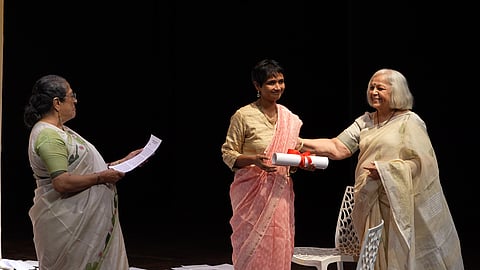
- LIFESTYLE
- FASHION
- FOOD
- ENTERTAINMENT
- EVENTS
- CULTURE
- VIDEOS
- WEB STORIES
- GALLERIES
- GADGETS
- CAR & BIKE
- SOCIETY
- TRAVEL
- NORTH EAST
- INDULGE CONNECT

The driving force behind Delhi’s Aagaaz Theatre Trust, Sanyukta Saha, was recently awarded the Shankar Nag Theatre Award, 2024 for her dedication to community-led theatre and her commitment to inclusivity in the arts. In a delightful conversation about theatre, she shares insights on the importance of recognising diverse voices in Indian theatre, the need to bridge gaps in accessibility, her vision for Aagaaz and so much more.
What does this award mean to you personally and professionally?
For me, the personal and professional often blur together. More than just recognition, the award legitimises a certain kind of theatre and artistes who come from diverse backgrounds. It underscores the fact that many voices have been missing in this ecosystem and they deserve a place in the mainstream, like any other practitioners. It is to create spaces that showcase performers from other communities as more than just their struggles or stereotypes. It’s about allowing them to tell any story they wish, so that the narrative becomes truly theirs. Groups like Aagaaz are just one example. All over the country, small, fledgling practices are sprouting up with unique voices. Once these practitioners are welcomed into the wider ecosystem, the arts will become that much more vibrant. Without this inclusion, it’s the same stories, told by the same people. We need more diversity.
What kind of initiatives could help bring about equality in the theatre world?
Both macro and micro changes. At a larger level, theatre should be accessible to all. When applied theatre becomes available to everyone, more artistes will naturally emerge from that exposure. Once children experience the art of storytelling, they’ll often gravitate towards it. On a smaller scale, the theatre community itself already has a spirit of generosity that fosters smaller, unique projects. You soon realise that the challenges aren’t just about creating art. There are legal issues, access to medical care and more. Addressing these issues simultaneously can foster a more inclusive theatre world. We cannot address Indian theatre as a monolithic entity. It’s incredibly diverse, with each niche having its own style and challenges. The lack of institutional support underscores the need for platforms where theatre practitioners can collaborate and pool resources, which would benefit all artistes in the field.
How did Aagaaz come to be and what is its current vision?
It all began in Basti Hazrat Nizamuddin in Delhi, where Aagaaz runs a community library and arts centre. Their work is deeply rooted in fostering a sense of community, inclusivity and freedom. Our mission is to create spaces that inspire compassionate, critical thinking and dialogue. At Aagaaz, children as young as three to elders in their 60s come together to participate. The library and arts centre are spaces for leisure, play and enjoyment. Once people find joy in books, storytelling and theatre, they naturally gravitate toward them. The core of Aagaaz is its theatre repertory, comprising young people from the neighbourhood. We met when they were in primary school and as they grew up, they realised that theatre was their calling — it’s community-led. From the outset, we knew a top-down approach wouldn’t work here, so we built something from the ground up. I was the only adult among these children and teenagers and we got together and we made Aagaaz happen and what we call Khwab Ghar now.
What are some misconceptions about community theatre that you would like to clarify?
Community theatre is often unfairly perceived as substandard or less polished than mainstream productions — not as flamboyant, glamorous or refined. But any group, with time and dedication, can build craft and rigour. Another misconception is the expectation that community theatre only portrays narratives of hardship. People expect it to reflect ‘poor lives, sad people,’ but that’s limiting. Human beings are multidimensional. We all have complex, full lives and ar tistes from any backg round should be able to tell more than one kind of story.